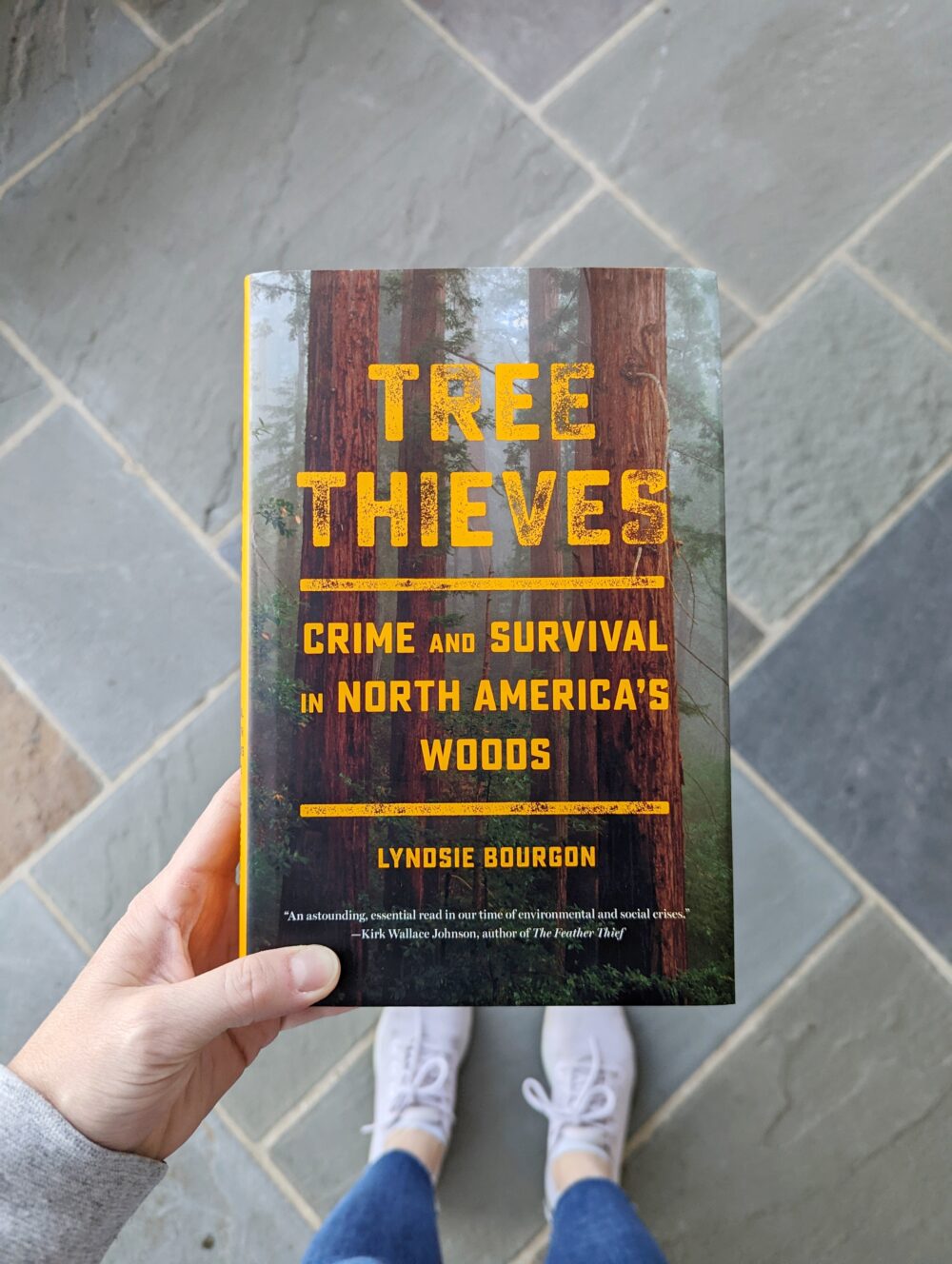Book Review of Tree Thieves: Crime and Survival in North America’s Woods
What happens when environmental policy seems good for the ecosystem but harms the community? Check out this review of Tree Thieves, a book that details the challenges faced by communities in the United States northwest woods that lost their livelihoods as a result of environmental protection for the old-growth forests.
This post contains affiliate links.

We’ve visited several National Parks over the last 5 to 10 years. Never while we hiked through dense woods filled with towering trees did I consider that I was walking through the stomping grounds of rampant tree thieves. It never occurred to me that trees were even a thing one could steal. They’re so large and, seemingly, so permanently rooted in the ground.
Tree Thieves: Crime and Survival in North America’s Woods by Lyndsie Bourgon details the complicated circumstances around environmental protection and the former timber industry workers stealing precious natural resources from some of the country’s most protected spaces. As environmental protection policies in places like the dense northwestern woods of the United States have been implemented over the last few decades, communities relying on the lumber industry in those areas have been decimated by job loss and industry transition.
Environmental policy has, understandably, placed strict limits on tree harvesting, particularly of old-growth trees and those that are the foundation of important biodiverse ecosystems. But until recently, many environmental policies ignored the consequences to their surrounding communities that have long survived almost exclusively on the timber economy.
As jobs left because timber harvesting declined or disappeared entirely, forests saw less decimation. But communities began to fall apart and struggle without jobs. Families who grew up knowing every inch of the forest and building their livelihood on its resources quickly lost their incomes and their identities. As a result, they turned to illegal logging and harvesting to earn income with the skills that accrued over a lifetime of hard work.
Tree Thieves highlights both sides of the dilemma when much-needed environmental protection carries real consequences for communities reliant on the land and resources for income. The author uses old-growth forests as the foundation for highlighting these dilemmas, but it’s a dilemma that spans many industries from coal, oil, and gas, to agriculture, manufacturing, and beyond.
As we modify industries for better environmental outcomes, people get left behind, and it’s really important to take care of these people along the way. We’ve seen somewhat similar consequences when National Parks are established on indigenous lands and the indigenous communities who call those lands home can no longer rely on their relationship with the land to survive and thrive.
While one scenario decimates jobs and the other steals land, both destroy cultures and communities for the protection of natural environments. On the surface, environmental protection is important. But these situations highlight the necessity to understand and respond to the nuances of impacts on all stakeholders.
I really enjoyed this book and the prospectives it highlights. The first part of the book felt a little choppy as the author jumped around between different people, primarily various members of the woodlands communities who became “criminals” (i.e. tree thieves) when they lost their jobs in the timber industry.
I couldn’t always keep each of the people and their respective stories straight, but I don’t feel like the essence of the book was lost on that account. As the key narratives come together, the author clearly sheds light on the competing objectives of people and the planet. It’s eye-opening and a good reminder to understand the consequences to local communities when environmental policies dramatically shift how industries in an area operate.
As organizations pass spending bills and implement regulations to address matters of climate change, many have criticized the social justice elements of such policies as unrelated and unnecessary to achieve the objectives of the legislation. But stories like those of the Tree Thieves highlight the importance of contextual social justice considerations being an important element of any climate action to ensure that we all end up better off in the end.
Time and again, and consistent with the communities in Tree Thieves, those most likely to be harmed by side effects of climate action and climate legislation are already marginalized due to considerations such as race, gender, and socioeconomic status.
In short, we must create more policy that protects our planet and our communities; we have mountains of necessary economic and social transition ahead of us related to climate change. But if we do not undergo the imperative transitions that also look out for those who will lose their livelihoods and lifestyles as a side effect, we will only create new problems, more division, and more inequality.

Jen Panaro
Jen Panaro, founder and editor-in-chief of Honestly Modern, is a self-proclaimed composting nerd and advocate for sustainable living for modern families. To find her latest work, subscribe to her newsletter, Stepping Stones.
In her spare time, she’s a serial library book borrower, a messy gardener, and a mom of two boys who spends a lot of time in hockey rinks and on baseball fields.
You can find more of her work at Raising Global Kidizens, an online space to help parents and caregivers raise the next generation of responsible global citizens.







